

Finding Clarity in Assessment and Grading. A recent Edutopia article about the question of zeros in classroom assessment set off a passionate debate filled with differing philosophies: “Kids need to learn how the real world works!”
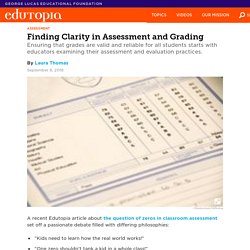
“One zero shouldn’t tank a kid in a whole class!” “There’s no reason not to let kids redo work until they demonstrate mastery!” “If we let them redo the work, they’ll never learn about deadlines!” Teachers also discussed practices like dropping a student’s lowest grade, allowing homework passes, and grading homework solely for attempt.
Going Gradeless: Student Self-Assessment in PBL. I like reading professional material.
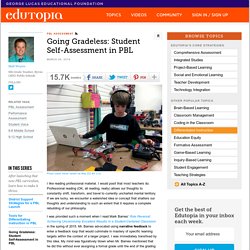
I would posit that most teachers do. Professional reading (OK, all reading, really) allows our thoughts to constantly shift, transform, and travel to currently uncharted mental territory. If we are lucky, we encounter a watershed idea or concept that shatters our thoughts and understanding to such an extent that it requires a complete rebuilding of our philosophy.
I was provided such a moment when I read Mark Barnes’ Role Reversal: Achieving Uncommonly Excellent Results in a Student-Centered Classroom in the spring of 2015. Mr. My Goal It was my intention to simultaneously promote mastery learning as well as increase students' ability to metacognitively assess their work against a given set of standards. My Plan I knew that I needed to maintain accountability to various stakeholders in this process -- the students, their families, and the administration. The Results. 6 Types Of Assessment Of Learning. 6 Types Of Assessment Of Learning by TeachThought Staff If curriculum is the what of teaching, and learning models are the how, assessment is the puzzled “Hmmmm”–as in, I assumed this and this about student learning, but after giving this assessment, well….”Hmmmmm.”
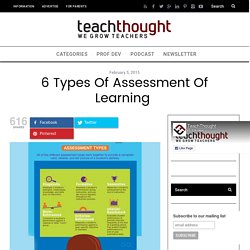
So what are the different types of assessment of learning? This graphic below from McGraw Hill offers up six forms; the next time someone says “assessment,’ you can say “Which type, and what are we doing with the data?” Like the TeachThought educator you are. 1.
Self assessment. Educational Leadership:Using Assessments Thoughtfully:The Bridge Between Today's Lesson and Tomorrow's. Refocusing assessment on teaching and learning. This post is sponsored by Curriculum Associates.
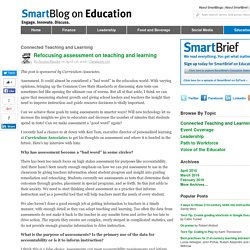
Assessment. It could almost be considered a “bad word” in the education world. With varying opinions, bringing up the Common Core State Standards or discussing state tests can sometimes feel like opening the ultimate can of worms. Free Resources and Tools for "Authentic" Assessment. The key to innovations in assessment and curriculum planning are trust, transparency, and collaboration -- and providing the professional development and training teachers need to succeed.
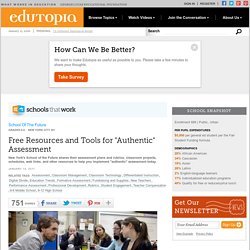
Credit: Tom LeGoff Note: The School of the Future is part of a network of New York schools that develops and uses its own assessment techniques, referred to as DYOs. The school also uses Tasks on Demand, or unannounced assessments that do not provide supports for the students, in order to measure their learning at regular intervals. Assessment. Life After Levels – An Assessment Revolution? Over recent months I’ve been involved in interviews for a number of posts across the Multi Academy Trust.
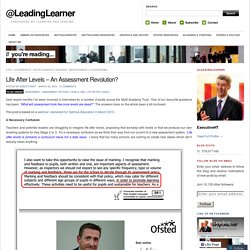
One of our favourite questions has been, “What will assessment look like once levels are dead?” The answers have on the whole been a bit confused. Final Exams…a Tradition Worth Exploring. I have been having many conversations this year with teachers about our practice of administering final exams for students.
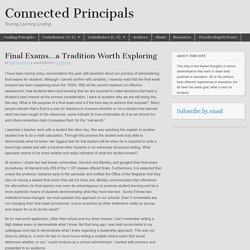
Although I cannot confirm with certainty, I recently read that the final exam process has been happening since the 1830s. With all the current research on effective assessment, how students learn and knowing that we are required to make decisions that have a student’s best interest as the primary consideration, I have to question why we are still doing this, this way. What is the purpose of a final exam and is it the best way to achieve that purpose? 2014_Article7_Phillipa. DERN. Personalised learning, reflection, collaboration and .critical thinking are highly valued in education, and classroom practices are changing towards learning as a collaborative activity.
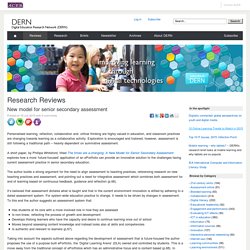
Grading Smarter, Not Harder: Tooth Brushes and Penalties. Grading Smarter, Not Harder: The Need for Change. Sara Grimm sur Twitter : "Where do your school assessments live? Thanks for the graphic @willrich45 #2020HowardWinn... 40 Alternative Assessments for Learning. When people think of assessment, pencils and bubble sheets may be the first things that come to mind.
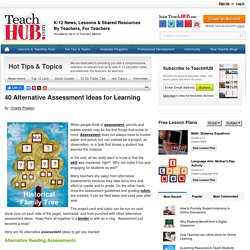
Assessment does not always have to involve paper and pencil, but can instead be a project, an observation, or a task that shows a student has learned the material. In the end, all we really want to know is that the skill was mastered, right? Why not make it fun and engaging for students as well? Many teachers shy away from alternative assessments because they take extra time and effort to create and to grade. On the other hand, once the assessment guidelines and grading rubric are created, it can be filed away and used year after year. The project card and rubric can be run on card stock (one on each side of the page), laminated, and hole punched with other alternative assessment ideas. Here are 40 alternative assessment ideas to get you started! Alternative Reading Assessments 1. Create a bookmark to match the theme of the last book read.
3 Classroom Tools to Measure Student Learning. Formative assessment is vital to teachers in any classroom environment.
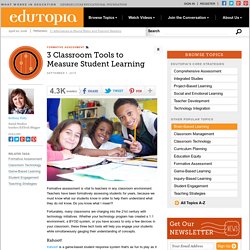
Teachers have been formatively assessing students for years, because we must know what our students know in order to help them understand what they do not know. Do you know what I mean?! Fortunately, many classrooms are charging into the 21st century with technology initiatives. Whether your technology program has created a 1:1 environment, a BYOD system, or you have access to only a few devices in your classroom, these three tech tools will help you engage your students while simultaneously gauging their understanding of concepts.
Building Meaningful Assessments. The Most Important Question Every Assessment Should Answer. The Question Every Assessment Should Be Able To Answer by Terry Heick. 10 Assessments You Can Perform In 90 Seconds. 10 Assessments You Can Perform In 90 Seconds by TeachThought Staff Good assessment is frequent assessment. Any assessment is designed to provide a snapshot of student understand—the more snapshots, the more complete the full picture of knowledge. On its best day, an assessment will be 100% effective, telling you exactly what a student understands. More commonly, the return will be significantly lower as the wording of questions, the student’s sense of self-efficacy, or other factors diminish their assessment performance.